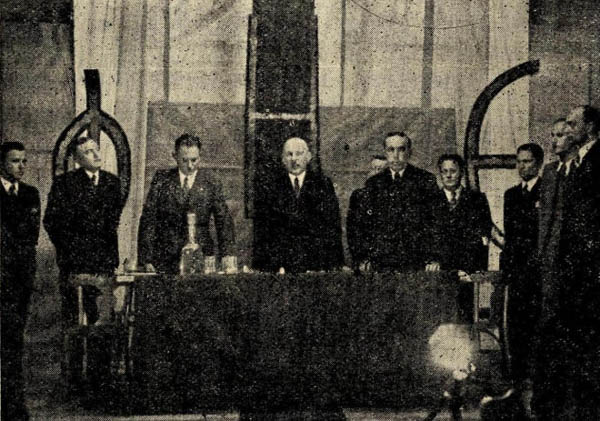Front of National Unity
Front of National Unity [Фронт національної єдности; Front natsionalnoi yednosty or ФНУ; FNU]. A nationalist organization on Polish-ruled Ukrainian territories. The FNU opposed the policy of normalizing relations with the Poles (normalization) pursued by the Ukrainian National Democratic Alliance (UNDO), as well as the revolutionary activity of the underground Organization of Ukrainian Nationalists (OUN). It arose in 1933 at the initiative of Dmytro Paliiv. Eventually an organizing committee was set up, consisting of Sylvestr Herasymovych as head, Paliiv as secretary, Rev M. Blozovsky, Volodymyr Kokhan, L. Savoika, and members of the Batkivshchyna co-operative publishing house (president: Ivan Teodor Rudnytsky; secretary: Myron Konovalets). On 1 February 1933 the first issue of the FNU’s biweekly Peremoha appeared (it became a quarterly in 1936). The Front’s goal was to organize an elite drawn from all social groups and classes of the Ukrainian nation. Eventually its ideological position was described as ‘creative nationalism’ (tvorchyi natsionalizm). As a result of vigorous educational and organizing efforts the FNU grew rapidly. In November 1934 the weekly Bat’kivshchyna began publication. The Batkivshchyna publishing house expanded its publishing program. In November 1935 the daily Ukraïns’ki visty began to appear.
On 20 September 1936 the First Congress of the FNU convened in Lviv. One hundred and fifty delegates, the majority of whom were peasants, participated. Dmytro Paliiv announced the party’s program, disassociating the Front from the terrorism used by the OUN and defining the purpose of Ukrainian nationalism to be the overcoming of the nation’s state of chaos and the attainment of a permanent state of organization and order. The family, based on Christian principles, was to be the foundation of the nation. ‘The Nation’s good is our highest command’ became the Front’s slogan.
The basic organizational units of the FNU were the so-called cohorts (druzhyny). These were organized by region under the leadership of region commanders (oblasni). The FNU was the first non-socialist organization in Western Ukraine that succeeded in attracting workers, including those who during the Ukrainization in Soviet Ukraine had fallen under the influence of communism. Among those who joined the FNU were disenchanted former members of the UNDO, OUN, and the monarchist Hetmanite movement, as well as non-partisan individuals.
The political collegium, which was elected at the congress, served as the supreme executive of the FNU. It consisted of Sylvestr Herasymovych (head), Dmytro Paliiv (leader of the FNU), Volodymyr Kokhan, L. Savoika, Mykola Shlemkevych, Stepan Volynets (secretary), Yurii Krokhmaliuk, M. Dzoba, and Ivan Hladylovych. Other influential members of the FNU were Volodymyr Dzis, D. Kuziv, Mykhailo Kushnir, and T. Rudensky. The political collegium ruled on all the principal organizational and political questions and determined the FNU’s program and tactics. The National Council, with 30 members, was a second governing body.
The Polish authorities interfered in the Front's activities by frequently confiscating its publications and arresting its active leaders. At the beginning of 1939, for example, the whole secretariat was arrested. In the autumn of 1935 the publication of Peremoha and Bat’kivshchyna was suspended, and the journal Khliborobs’kyi shliakh offered space on its pages to the FNU.
With the outbreak of the German-Polish War (see Second World War) many leading members of the FNU left Soviet-occupied Western Ukraine. Since it also became impossible to conduct independent Ukrainian politics under the German occupation on the territory of the Generalgouvernement, Dmytro Paliiv suspended the FNU’s activities. In spring 1941 at a meeting in Krynytsia (Krynica) the political collegium dissolved the organization. Its members were instructed to join the civic organization known as the Ukrainian Central Committee and its constituent bodies.
Stepan Volynets
[This article originally appeared in the Encyclopedia of Ukraine, vol. 1 (1984).]

